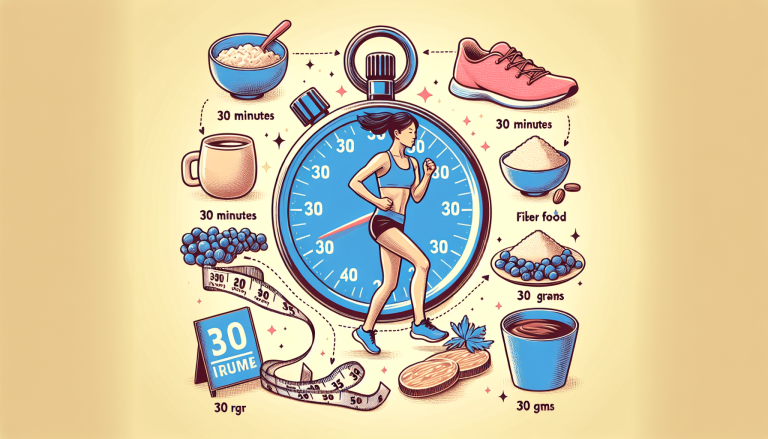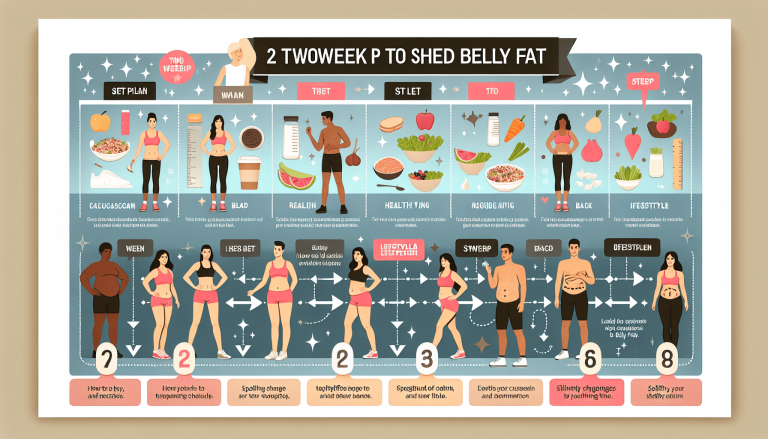How Do I Lose Weight Quickly?
Have you ever wondered how to shed those extra pounds in a quick and effective manner? Look no further! In this article, we will explore some simple and practical strategies to help you lose weight rapidly. From making small changes to your daily routine to incorporating healthier eating habits, you’ll discover easy steps to achieve your weight loss goals. So, if you’ve been wondering how to join the ranks of successful weight losers, read on and unlock the secrets to losing weight quickly.

Set Clear Goals
Determine your desired weight loss
Before beginning any weight loss journey, it’s essential to determine your desired weight loss. Take some time to think about what weight you would like to achieve and set a realistic goal for yourself. Keep in mind that healthy weight loss is typically 1-2 pounds per week. By having a clear vision of your desired weight loss, you can stay motivated and track your progress effectively.
Set a timeline
Setting a timeline for your weight loss journey can help you stay focused and motivated. Determine how long you would like to take to reach your goal weight and create a timeframe accordingly. It’s important to make sure your timeline is reasonable and attainable. Remember, slow and steady progress is key to sustainable weight loss.
Break down your goals into smaller milestones
Breaking down your weight loss goals into smaller milestones can make them more manageable and achievable. Instead of solely focusing on the end result, establish smaller targets along the way. For example, aim to lose a certain number of pounds each month or set a goal to fit into a specific clothing size. By celebrating these smaller milestones, you’ll feel a sense of accomplishment and stay motivated throughout your journey.
Create a Calorie Deficit
Calculate your daily calorie needs
To lose weight, you need to create a calorie deficit, which means consuming fewer calories than your body needs to maintain its current weight. Start by calculating your daily calorie needs using a trusted online calculator or consulting a nutritionist. This will give you a baseline number of calories you should aim to consume each day.
Reduce your calorie intake
Once you know your daily calorie needs, you can start reducing your calorie intake. Make small and sustainable changes to your diet by opting for healthier alternatives and reducing portion sizes. Choose nutrient-dense foods that are lower in calories but still provide essential vitamins and minerals. Focus on incorporating more fruits, vegetables, whole grains, and lean proteins into your meals.
Increase physical activity to burn more calories
In addition to reducing your calorie intake, increasing your physical activity is essential for creating a calorie deficit. Find activities you enjoy, whether it’s walking, jogging, swimming, dancing, or attending fitness classes. Aim for at least 150 minutes of moderate-intensity aerobic activity or 75 minutes of vigorous-intensity aerobic activity per week. Incorporate strength training exercises to build lean muscle, which can help boost your metabolism and burn more calories even at rest.
Follow a Balanced Diet
Include a variety of fruits and vegetables
Including a variety of fruits and vegetables in your diet is crucial for weight loss. They are low in calories and high in essential nutrients, fiber, and antioxidants. Aim to fill half of your plate with colorful fruits and vegetables at every meal. Experiment with different types and try incorporating them into smoothies, salads, stir-fries, or as healthy snacks. Not only will they support your weight loss goals, but they will also improve your overall health.
Choose lean sources of protein
Protein is an essential nutrient that can aid in weight loss by reducing hunger and preserving lean muscle mass. Opt for lean sources of protein such as skinless chicken, turkey, fish, tofu, legumes, and low-fat dairy products. Including protein-rich foods in your meals can help keep you feeling full for longer and prevent overeating. Aim to have protein with every meal and snack to support your weight loss efforts.
Limit processed and sugary foods
Processed and sugary foods are often high in calories, unhealthy fats, and added sugars. These foods can lead to weight gain and hinder your progress. Limit your consumption of processed snacks, sugary drinks, desserts, and fast food. Instead, focus on whole, unprocessed foods that are nutrient-dense and provide energy without excessive calories. Opt for whole grains, lean proteins, healthy fats, and natural sweeteners when necessary.
Monitor portion sizes
Even if you’re eating healthy foods, portion control is crucial for weight loss. Pay attention to serving sizes and try to avoid oversized portions. Use smaller plates and bowls to help control the amount of food you consume. Listen to your body’s hunger and fullness cues, and eat slowly to allow your brain to register when you’re satisfied. By practicing portion control, you can enjoy a balanced diet while still working towards your weight loss goals.
Stay Hydrated
Drink plenty of water throughout the day
Staying hydrated is key for overall health and weight loss. Make it a habit to drink plenty of water throughout the day. Water helps flush out toxins, aids digestion, and can even boost metabolism. Carry a water bottle with you and take sips regularly to ensure you’re staying hydrated. Aim to drink at least eight glasses of water per day, or more if you’re physically active or in a hot climate.
Avoid sugary drinks and excessive alcohol consumption
Sugary drinks like soda, fruit juices, and energy drinks are high in calories and can sabotage your weight loss efforts. Instead, opt for water, unsweetened tea, or infused water with fresh fruits for flavor. When it comes to alcohol, moderate consumption is key. Alcoholic beverages are often high in calories and can lower inhibitions, leading to unhealthy food choices. Limit your alcohol intake and be mindful of the calories it adds to your overall diet.

Incorporate Regular Exercise
Choose activities you enjoy
Incorporating regular exercise is vital for weight loss and overall well-being. Choose activities that you enjoy, as this will increase the chances of sticking with them long-term. Whether it’s jogging, cycling, dancing, swimming, or playing a sport, find activities that bring you joy and make you feel good. Physical activity should be fun and something you look forward to, rather than a chore.
Include both cardio and strength training
A well-rounded exercise routine should include both cardiovascular exercises and strength training. Cardio activities, such as brisk walking, running, or cycling, can help burn calories and improve cardiovascular health. Strength training, on the other hand, helps build lean muscle, which can increase your metabolism and aid in weight loss. Incorporate strength training exercises at least two days a week, focusing on different muscle groups.
Start with shorter sessions and gradually increase duration
If you’re new to exercise or getting back into it after a long break, it’s important to start with shorter sessions and gradually increase the duration and intensity. Listen to your body and don’t push yourself too hard too soon. Begin with 20-30 minutes of moderate-intensity exercise and gradually add more time or increase the intensity as your fitness levels improve. Remember, consistency is key, and even short workouts can be effective when done regularly.
Set specific exercise goals
Setting specific exercise goals can help you stay motivated and measure your progress. Whether it’s completing a 5K run, mastering a new yoga pose, or lifting a certain amount of weight, having something to strive for can keep you focused and enthusiastic. Write down your goals and track your performance. Celebrate each achievement along the way, no matter how small, as it will keep you motivated and eager to continue your weight loss journey.
Get Sufficient Sleep
Maintain a consistent sleep schedule
Getting sufficient sleep is often overlooked but plays a crucial role in weight loss and overall health. Aim to maintain a consistent sleep schedule by going to bed and waking up at the same time every day, even on weekends. This helps regulate your body’s internal clock and improve the quality of your sleep. Establishing a bedtime routine and creating a peaceful sleep environment can also promote better sleep.
Aim for 7-9 hours of quality sleep per night
Most adults need 7-9 hours of quality sleep per night to function optimally. Sleep deprivation can interfere with weight loss efforts as it affects hunger and satiety hormones, leading to increased cravings and overeating. Make sleep a priority and ensure you’re getting enough restorative sleep each night. If you have difficulty falling or staying asleep, practice relaxation techniques or consult a healthcare professional for guidance.

Create a relaxing bedtime routine
Establishing a relaxing bedtime routine can signal to your body that it’s time to wind down and prepare for sleep. Engage in calming activities such as reading a book, taking a warm bath, practicing gentle stretching or yoga, or listening to soothing music before bed. Avoid stimulating activities or electronic devices that emit blue light, as they can interfere with your sleep quality. By creating a consistent bedtime routine, you can promote restful sleep and support your weight loss journey.
Manage Stress
Identify sources of stress
Stress can impact weight loss by triggering emotional eating and disrupting healthy habits. Take the time to identify the sources of stress in your life, whether it’s work, relationships, finances, or other external factors. By recognizing these stressors, you can work towards finding effective coping mechanisms and strategies to manage them.
Practice stress-reducing techniques like meditation or yoga
Incorporating stress-reducing techniques into your daily routine can be beneficial for both your mental health and weight loss efforts. Engage in activities like meditation, deep breathing exercises, or yoga to promote relaxation and reduce stress levels. These practices can help you stay centered, improve mood, and prevent emotional eating. Find what works best for you and make it a habit to incorporate these techniques regularly.
Engage in hobbies or activities that help you relax
Finding hobbies or activities that help you relax and unwind is important for managing stress and supporting your weight loss journey. Engage in activities that bring you joy and allow you to disconnect from daily stressors. It could be anything from reading, gardening, painting, playing an instrument, or spending time in nature. By incorporating enjoyable activities into your routine, you can effectively reduce stress and maintain a positive mindset.
Track Your Progress
Keep a food and exercise journal
Keeping a food and exercise journal can be a powerful tool for weight loss. Write down everything you eat and drink, as well as the type and duration of exercise you engage in. This helps raise awareness of your eating and exercise habits, making it easier to identify areas for improvement. Additionally, it holds you accountable and allows you to track your progress over time.
Take regular body measurements
In addition to tracking your food and exercise, taking regular body measurements can provide a more comprehensive picture of your progress. Use a tape measure to measure your waist, hips, arms, and thighs every few weeks. Sometimes the scale may not reflect accurate progress due to changes in body composition, but measurements can show actual inches lost or gained. Remember that weight is just one aspect of your health, and body measurements can offer a more holistic view.

Use technology or apps to monitor progress
Technology and smartphone apps can make tracking your progress even easier. There are numerous apps available that can help you monitor your food intake, exercise, and track your weight loss journey. These apps often provide insights, tips, and support to help you stay on track. Explore different options and find one that aligns with your goals and preferences.
Stay Consistent
Create a routine and stick to it
Consistency is key when it comes to successful weight loss. Create a routine that works for you and stick to it. Establish regular meal times, exercise sessions, sleep patterns, and self-care rituals. By following a consistent routine, you reduce decision fatigue and make healthy choices effortless. Remember, healthy habits are formed through consistent repetition.
Avoid skipping meals or engaging in crash diets
Skipping meals or engaging in crash diets may seem tempting for quick weight loss, but they are not sustainable or healthy in the long run. These practices can lead to nutrient deficiencies, slowed metabolism, and ultimately weight regain. Instead, focus on nourishing your body with balanced meals and snacks throughout the day. Practice portion control and choose whole, nutrient-dense foods. This approach supports long-term weight loss and overall well-being.
Make healthy choices a habit
When it comes to weight loss, it’s not about temporary changes, but rather making healthy choices a habit. Incorporate nutritious foods into your daily meals, prioritize regular physical activity, and practice stress management techniques consistently. Over time, these healthy choices will become second nature and enhance your overall lifestyle. Remember, small and sustainable changes lead to significant and long-lasting results.
Seek Support
Join a weight loss program
Joining a weight loss program can provide you with the necessary guidance, support, and accountability on your journey. These programs often offer structured meal plans, exercise routines, and coaching to help you reach your goals. Look for a program that aligns with your values and lifestyle, ensuring it provides a balanced approach to nutrition, exercise, and overall well-being.
Find a workout buddy
Having a workout buddy can make exercising more enjoyable and increase motivation. Find someone who shares similar fitness goals and values and commit to working out together regularly. You can hold each other accountable, celebrate milestones together, and provide support during challenging times. Having a workout buddy can make your weight loss journey more fun and prevent feelings of isolation.
Share your goals with friends and family for accountability
Sharing your weight loss goals with friends and family can provide an extra layer of accountability. Inform them about your aspirations and ask for their support and encouragement. They can help keep you on track and remind you of your goals when temptations arise. Sharing your journey with loved ones not only fosters accountability but also allows you to celebrate achievements and share the joys of your progress.
Consider consulting a nutritionist or fitness professional
If you’re unsure where to start or have specific dietary or exercise concerns, consider consulting a nutritionist or fitness professional. They can provide personalized guidance and help tailor a plan that suits your individual needs and preferences. These professionals have the expertise to ensure you’re making informed decisions and can offer valuable insights to optimize your weight loss journey.
In conclusion, losing weight quickly and sustainably requires setting clear goals, creating a calorie deficit, following a balanced diet, staying hydrated, incorporating regular exercise, getting sufficient sleep, managing stress, tracking progress, staying consistent, and seeking support. By implementing these recommendations, you can embark on a successful weight loss journey while maintaining good health and well-being. Remember, small changes add up over time, and your commitment and dedication will lead to long-lasting results. Start today and embrace the transformative power of healthy habits.
Additional Resources

You’ve probably heard of Ozempic and its impressive weight loss results.
But what if there was something even more powerful?
After 12 years of rigorous research with over 24,000 patients in a cutting-edge weight loss clinic in Burke, VA, a brilliant Board-Certified Doctor has uncovered a method that might beat Hollywood’s weight loss pill.
This isn’t about another painful injection, $1k prescription drug, or invasive surgery. It’s about regenerating one specific organ in your body, transforming it into a rapid fat-burning powerhouse. And the best part? It takes a mere 2 minutes a day!
Can you guess which organ you must regenerate in order to reach your ideal weight in record time?
Is it your…
a) Liver
b) Brain
c) Stomach
d) Thyroid or
e) Your Kidneys?
For the answer and to see why it can actually melt 35Ibs in just 12 weeks, go to this page.







